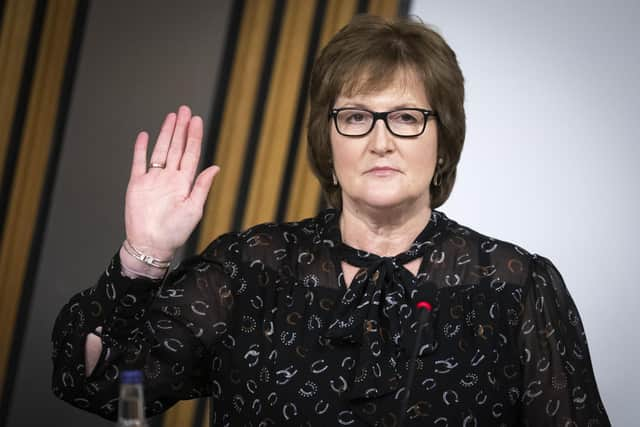Alex Salmond inquiry: Civil servant had 'no doubts' her prior contact with complainers was appropriate


Judith Mackinnon, who led the government’s investigation into harassment complaints against former first minister Alex Salmond and whose appointment as investigating officer ultimately led to the concession of the subsequent judicial review, gave evidence to MSPs in audio form.
The director of communications Barbara Allison, who received the infamous “battle maybe lost, but not the war” text from permanent secretary Leslie Evans, also gave evidence to the Salmond Inquiry in person.


Advertisement
Hide AdAdvertisement
Hide AdThe committee also heard from both witnesses that the aspect of the complaints procedure hat led to the concession of the judicial review - paragraph ten – had not been changed since the decision was taken to concede.
Ms Mackinnon led the investigation into the complaints against Mr Salmond, but her contact with the complainers prior to being appointed as the investigating officer led the Court of Session to conclude the process had been “tainted with apparent bias” and was unlawful.
The court found the Scottish government had breached its own procedures by appointing her to conduct the investigation, which was supposed to be independent.
This mistake led to the Scottish government paying £500,000 in legal costs to Mr Salmond.
During the evidence session, which began with MSPs unable to hear the witness, Ms Mackinnon told MSPs she was “always upfront” about her prior contact with the complainers Ms A and Ms B and said having prior contact with the complainers was “absolutely in line with my role as head of people advice”.
When asked whether she accepted the accusation of apparent bias, Ms Mackinnon said she thought her involvement was “appropriate throughout” and that she “wouldn’t even have thought” that apparent bias would be a problem at the time she was appointed investigating officer.
Ms Mackinnon also told MSPs that she had regularly sought legal advice, but deliberately avoided naming the specific Scottish government lawyer responsible for the advice on her appointment as investigating officer.
She said the role of investigating officer was “very clearly set out” in previous drafts of the procedure, which included a “very clear” description of the “engagement the investigating officer could have with potential complainers” and she acted in this capacity with the knowledge of previous versions of the guidance.
Advertisement
Hide AdAdvertisement
Hide AdMs Mackinnon said: “Through drafting changes of the procedure, that detail was removed and the final phrase that was left in paragraph ten of the procedure was the IO would have no involvement with the issues being raised has it seems left that open to interpretation and potentially of accusations of apparent bias.”
She said the Scottish government had “not had the time” to issue detailed guidance about the role of the investigating officer, but said it was “clear from early doors” what was expected in the role.
Both Ms Mackinnon and Ms Allison confirmed the paragraph at the centre of the judicial review had not yet been changed by the Scottish government and remains ‘under review’ as part of an internal government process.
While struggling to answer questions on specifics of when the procedure came to include former ministers, Scottish Labour MSP Jackie Baillie mused: “I appreciate it is a long time ago and you are not alone in having a failing memory.”
Ms Baillie’s questions also saw Ms Mackinnon state that an email from her boss, Nicola Richards, had indicated to the complainers she was likely to be the investigating officer.
Ms Baillie said it was “hard to believe” and Ms Mackinnon was “straining the credibility of the committee” to ask them to believe she did not look at the final policy and see that there should have been a clear separation of roles.
Ms Mackinnon said: “I did read paragraph ten, but it does not make explicit the separation of roles. I think that is open to interpretation and that is the challenge that we faced.
"That the detail was not there meant that it was open to another interpretation than the one we had taken.”
Advertisement
Hide AdAdvertisement
Hide AdMs Mackinnon said handing a copy of the draft complaints procedure to one of the complainers was “common practice”, but admitted it was “not ideal” it had not been finished.
The civil servant said she “absolutely refuted” any suggestion she had made up her mind on the veracity of the complaints and added she wished they had retained the detail of the investigating officer role in the procedure.
During the judicial review process, MSPs were told meetings took place up to three times a week between senior civil servants, including Nicola Sturgeon’s chief of staff Liz Lloyd and another special adviser, the head of communications, Stuart Nicolson, along with Scottish government lawyers.
Both Ms Mackinnon and Ms Allison said these were “update” meetings where the judicial review was discussed in terms of potential media lines and to later update the complainers, but no decisions on the judicial review were taken.
However, Ms Mackinnon said: “It was all absolutely known by the people who were involved that the nature of the prior contact was happening.”
She added she was also aware of offers from Mr Salmond for mediation with the complainers, which were declined by the two women at the heart of the complaint.
When asked whether she was shocked by the result of the judicial review, Ms Mackinnon said: “Yes, I was.
"I felt I had acted appropriately throughout, objectively, fairly and in line with the policy and the process and so the final decision. I am not a lawyer, so I am not best placed to understand the technical nature of the decisions that were made or the basis of those decisions – but yes, I can’t say I wasn’t shocked.”
Advertisement
Hide AdAdvertisement
Hide AdFollowing Ms Mackinnon, Ms Allison was faced with several questions of the nature of a “conspiratorial” text the permanent secretary Leslie Evans sent her following the concession of the judicial review.
Having initially denied receiving the text, which states “battle maybe lost, but not the war”, Ms Allison said she had deleted the message and did not recall what she had sent to illicit the response from Ms Evans.
She told MSPs “I didn’t recall having received this message, I was answering to my best recollection at the time” and added she then contacted the Crown Officer for copies of anything handed over as part of the criminal trial.
Asked what the ‘battle’ was, Ms Allison said she believed the battle to be the judicial review and the war to mean the permanent secretary’s aim to make sure women can come forward with harassment complaints.
Later pressed on whether she had encouraged members of staff to go to the police following intervention from a special adviser, Ms Allison said no, but said there had been one person who was highlighted in correspondence.
The First Minister Nicola Sturgeon is yet to give her evidence to the committee, but Mr Salmond is expected to be invited to give his evidence in December.
The inquiry continues.
A message from the Editor:
Thank you for reading this article. We're more reliant on your support than ever as the shift in consumer habits brought about by coronavirus impacts our advertisers.
If you haven't already, please consider supporting our trusted, fact-checked journalism by taking out a digital subscription.
Comments
Want to join the conversation? Please or to comment on this article.
